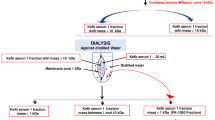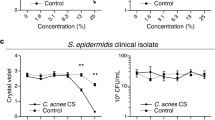Abstract
In order to prevent drying of the nutrient agar during studies of the growth of Staphylococcus aureus E169 at elevated temperatures, the Petri dishes were sealed with ‘Scotch’ brand cellulose adhesive tape (Minnesota Mining and Manufacturing (Australia) Pty., Ltd.) or with paraffin wax. The observation that the number of colonies on plates sealed with tape was considerably less than the number on otherwise comparable unsealed or wax-sealed plates suggested that the tape contained a volatile component which inhibited the bacterial growth.
This is a preview of subscription content, access via your institution
Access options
Subscribe to this journal
Receive 51 print issues and online access
$199.00 per year
only $3.90 per issue
Buy this article
- Purchase on Springer Link
- Instant access to full article PDF
Prices may be subject to local taxes which are calculated during checkout
Similar content being viewed by others
Author information
Authors and Affiliations
Rights and permissions
About this article
Cite this article
HOUGHTON, R., MAY, J. Bacteriostasis of Staphylococcus aureus by a Volatile Component of ‘Scotch’ Brand Cellulose Adhesive Tape. Nature 201, 1346–1347 (1964). https://doi.org/10.1038/2011346a0
Issue Date:
DOI: https://doi.org/10.1038/2011346a0
This article is cited by
Comments
By submitting a comment you agree to abide by our Terms and Community Guidelines. If you find something abusive or that does not comply with our terms or guidelines please flag it as inappropriate.



